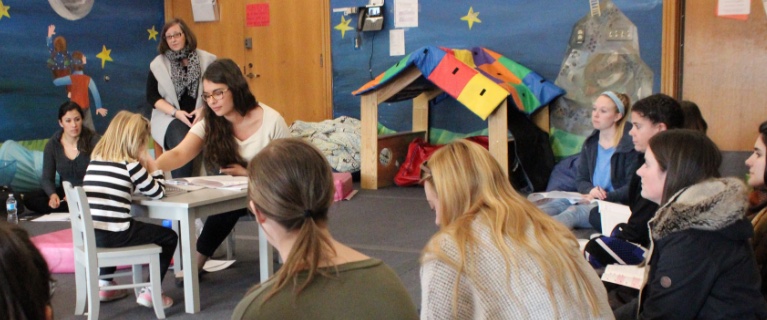
How to Become a School Counselor
By identifying students’ strengths, managing their areas for growth, and providing information and support along the way, school counselors help students grow and progress through the school system.
In the process, counselors help students develop skills that will allow them to thrive academically, socially and emotionally throughout their lives. Counselors have the opportunity to impact the lives of all students across a school system.
If you are interested in becoming a school counselor, learn more about the role and steps to becoming one below.
Jump to:
What Does a School Counselor Do?
What Traits Should a School Counselor Have?
Why Become a School Counselor?
The CPCE Exam
Why Earn Your Master’s in School Counseling Online with the University of Denver?
What Does a School Counselor Do?
The role of a school counselor has evolved to become a central driver of student success in P–12 schools. Counselors interpret cognitive, aptitude and achievement tests; student records; and grade-point averages—and then develop a plan to address any issues they present.
This includes working individually with students, collaborating with teachers and principals, and designing and implementing comprehensive school counseling programs that help support all students in the school system through each important developmental period—elementary through high school.
As a counselor, you will work with parents, faculty, other mental health professionals and your administration to create programs based on the academic, social and behavioral needs of the students you support. Counselors may work on an individual or school-wide level to help address the needs in the community.
Elementary School Counselors
Elementary school students are just beginning to develop their sense of self. This means they’re still building their decision-making skills, self-confidence and self-control. Through individual sessions and the implementation of comprehensive school-wide counseling programs, elementary school counselors work with kids to help cultivate these crucial skillsets.
They also work with parents and teachers to identify special academic, social or emotional needs early on and intervene if needed.
Middle School Counselors
Middle school can be a challenging time for students and their families. As a result, student counselors play a critical role during this time. Through individual sessions and the implementation of comprehensive school-wide counseling programs, middle school counselors help students navigate their changing needs while continuing to help cultivate the academic, emotional and social skills necessary for success.
High School Counselors
In addition to helping students manage the challenges that come with adolescence, high school counselors—through individual sessions and the implementation of comprehensive school-wide counseling programs—prepare students for life after they graduate from high school.
This can include serving as a resource as they transition to the next phase of life—including by supporting resume writing, engaging in interview practice, or helping to navigating the college application, financial aid and scholarship processes.
Jump to:
What Does a School Counselor Do?
What Traits Should a School Counselor Have?
Why Become a School Counselor?
The CPCE Exam
Why Earn Your Master’s in School Counseling Online with the University of Denver?
What Traits Should a School Counselor Have?
In addition to training and licensure, there are a few soft skills and personality traits that are crucial for doing the job of a school counselor effectively. These include:
- Adaptability: The role of a school counselor changes day to day—sometimes even hour to hour. They need to be able to quickly adapt to changing needs within their school system and community.
- Empathy and compassion: School counselors work with students from all different backgrounds and with a wide array of needs. This role requires a deep sense of empathy and compassion for students as they learn to address issues that arise during the key developmental stages in their lives.
- Listening skills: Effective counseling programs don’t just come from school data—they also require insights from the students themselves. School counselors have to be great listeners so they can identify the issues a student is struggling with and help develop solutions that work for that student.
- Communication skills: As noted above, school counselors interact with almost every person within the school system. To do their jobs well, they need to be able to communicate in a way that resonates with each of these people.
While exploring graduate schools for your master’s in school counseling, be sure to look for one that will help you harness these traits and apply them in a real-world setting.
The online master’s in school counseling from University of Denver’s Morgridge College of Education keeps its class sizes small so you always have a chance to participate in discussions and work closely with your professors to cultivate these soft skills.
Jump to:
What Does a School Counselor Do?
What Traits Should a School Counselor Have?
Why Become a School Counselor?
The CPCE Exam
Why Earn Your Master’s in School Counseling Online with the University of Denver?
Why Become a School Counselor?
School counselors work with children at some of the most critical points in their lives—and have the opportunity to influence them for the better. Because counselors decide what in-school counseling programs include and entail, they can also enact changes in the school system and, as a result, in their broader community.
Studies have shown that students who have access to school counselors and comprehensive school counseling programs are more likely to succeed academically and behaviorally in school—and this is particularly true for students in high-poverty schools.1
The role of a school counselor also changes day to day. One day, counselors might be providing individual emotional support for a student; the next, they could be analyzing school data to craft changes to the program curriculum. Counselors work with almost every member of the school system—including students, parents, teachers, school staff and other mental health professionals.
Steps to Becoming a School Counselor
The path to becoming a school counselor can seem complicated, but the journey prepares you for a rewarding career as a resource and mentor for students in P–12 environments. Use the steps below to help with your educational and career planning.
Step 1: Earn a Bachelor’s Degree
Both bachelor’s and master’s degrees are required to practice as a school counselor. Many students choose to earn a bachelor’s in counseling, psychology or education—though a specific major isn’t required—as these programs include courses on the topics related to this career path.
Step 2: Earn a Master of Arts in School Counseling
A master’s in school counseling, child psychology or a related field is required to practice as a school counselor in most states. These degrees allow you to study psychology, human and child development, and the modern school counseling techniques you need to perform your job effectively.
Step 3: Complete Your Internship or Practicum
Typically, master’s degree programs require students to complete field work experience, which is needed to be eligible for licensure. Requirements for licensure vary from state to state, so you should review your state’s requirements on the Morgridge College of Education’s website.
Step 4: Pass Your Comprehensive Exam
Once you complete the necessary coursework and receive your advisor’s approval, many master’s programs also require that you pass a comprehensive examination, such as the Center for Credentialing & Education’s Counselor Preparation Comprehensive Examination (CPCE), to be eligible to graduate.
Step 5: Pass Your State’s Licensing Exam
Exams vary from state to state and may require extra hours in the field. As noted above, you can review your state’s requirements on the Morgridge College of Education’s website.
Step 6: Apply for Licensure
Once you pass any required licensing exam, you will need to apply for and gain licensure before beginning to practice as a school counselor.
Step 7: Apply for Additional Certifications
Many organizations offer additional certifications for school counselors who want to build specialized expertise in a particular subject area. These areas can include anxiety, bully prevention, career development and students with special needs.
Learn more about additional certifications on the American School Counselor Association website.
Step 8: Apply for Open School Counselor Positions
Once you complete your master’s program and pass all required licensure exams and state requirements, you may be eligible to apply for school counseling roles in P–12 schools. When exploring graduate schools, consider your program’s career guidance and support. Programs like SchoolCounseling@Denver offer career services long after graduation.
The CPCE Exam
CPCE is a comprehensive exam that some programs, including the University of Denver’s online master’s in school counseling, require for you to graduate. For Denver’s program, you will need to seek out the test, pay the required fee and book it once you complete your necessary course requirements.
Jump to:
What Does a School Counselor Do?
What Traits Should a School Counselor Have?
Why Become a School Counselor?
The CPCE Exam
Why Earn Your Master’s in School Counseling Online with the University of Denver?

Why Earn Your Master’s in School Counseling Online with the University of Denver?
The online master’s in school counseling from University of Denver’s Morgridge College of Education is designed to adhere to the Council for Accreditation of Counseling and Related Educational Programs (CACREP) standards.2
The curriculum will equip you to take a “systems approach” to counseling, which includes developing comprehensive programs that address all students’ needs across a school.
With 700 hours of direct and indirect counseling practice and courses like Diversity: Multicultural Counseling Psychosocial Issues (which provides an overview of multicultural and social justice issues in the United States) the University of Denver curriculum will prepare you to be an agent of change in your school and community long after graduation.
Each state establishes its own rules, standards and procedures for the licensure/certification of school counselors, which may be different from the requirements to qualify to practice in Colorado. SchoolCounseling@Denver prepares students to obtain an Emergency Credential in Colorado. If you wish to practice in a different state, consult your state’s board of education to determine the licensure requirements you’ll need to meet.
Get Started
Take the next step in building a career you’re proud of. Request information about SchoolCounseling@Denver today.

